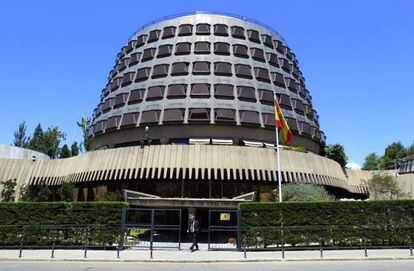Constitutional Court annuls Catalan independence declaration motion
Spain’s top tribunal unanimously nullifies regional bill marking start of secession process


In one of its fastest rulings ever, Spain’s Constitutional Court has annulled the independence declaration that was approved by the Catalan parliament on November 9. By doing so, the country’s top tribunal has hobbled the text that was voted through by pro-independence groups Junts pel Sí and CUP, the essence of which was the start of a process to unilaterally break away from Spain.
The wording of the declaration called for the disobedience of Spanish institutions, starting with the Constitutional Court itself
The court, which is made up of 11 members, has thus approved the appeal that was filed by the central government in Madrid on November 11, two days after the parliament in the northeastern region approved the independence resolution.
The wording of the declaration called for the disobedience of Spanish institutions, starting with the Constitutional Court itself, and stated that the Catalan government should only comply with laws it itself had established.
The head of the Constitutional Court, Francisco Pérez de los Cobos, wanted to rule on the appeal before the general election campaign got underway on Friday. De los Cobos took the decision to fast-track the deliberations of the court after he guaranteed that there would be a wide consensus in favor of annulling the declaration. The magistrates from the court met on Tuesday and spent three hours debating the proposal. After some changes were made, the definitive ruling was released on Wednesday.
The Popular Party government in Madrid is fiercely opposed to independence for Catalonia and has already taken other measures, such as the region’s bid for a referendum on its future, to the Constitutional Court.
What's more, the government has rushed through legislation that will enable the court to sanction and even suspend high-ranking officials who do not observe its rulings. This bill was created expressly to deal with the situation in Catalonia. The ruling passed down today by the Constitutional Court does not make express mention of this possibility. The magistrates will now have to decide whether to include in the final sentence a warning about the consequences of not observing their decision.
The Catalan parliament’s independence declaration, which was voted through with 72 deputies in favor and 63 against, included provisions for “the creation of laws within a maximum of 30 days for the process to create [regional] social security and public tax collection bodies.” However, the speaker of the parliament, Carme Forcadell, later lowered the tone of the rhetoric in her response to the appeal at the Constitutional Court by stating that the text is “a wish, aspiration and a desire,” and lacks legal implications.
English version by Simon Hunter.










































